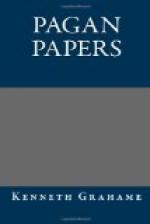But we are now in another and stricter sense an island of chemins qui cheminent: dominated, indeed, by them. By these the traveller, veritably se guindans, may reach his destination ``sans se poiner ou se fatiguer’’ (with large qualifications); but sans very much else whereof he were none the worse. The gain seems so obvious that you forget to miss all that lay between the springing stride of the early start and the pleasant weariness of the end approached, when the limbs lag a little as the lights of your destination begin to glimmer through the dusk. All that lay between! ``A Day’s Ride a Life’s Romance’’ was the excellent title of an unsuccessful book; and indeed the journey should march with the day, beginning and ending with its sun, to be the complete thing, the golden round, required of it. This makes that mind and body fare together, hand in hand, sharing the hope, the action, the fruition; finding equal sweetness in the languor of aching limbs at eve and in the first god-like intoxication of motion with braced muscle in the sun. For walk or ride take the mind over greater distances than a throbbing whirl with stiffening joints and cramped limbs through a dozen counties. Surely you seem to cover vaster spaces with Lavengro, footing it with gipsies or driving his tinker’s cart across lonely commons, than with many a globe-trotter or steam-yachtsman with diary or log? And even that dividing line — strictly marked and rarely overstepped — between the man who bicycles and the man who walks, is less due to a prudent regard for personal safety of the one part than to an essential difference in minds.
There is a certain supernal, a deific, state of mind which may indeed be experienced in a minor degree, by any one, in the siesta part of a Turkish bath. But this particular golden glow of the faculties is only felt at its fulness after severe and prolonged exertion in the open air. ``A man ought to be seen by the gods,’’ says Marcus Aurelius, ``neither dissatisfied with anything, nor complaining.’’ Though this does not sound at first hearing an excessive demand to make of humanity, yet the gods, I fancy, look long and often for such a sight in these unblest days of hurry. If ever seen at all, ’tis when after many a mile in sun and wind — maybe rain — you reach at last, with the folding star, your destined rustic inn. There, in its homely, comfortable strangeness, after unnumbered chops with country ale, the hard facts of life begin to swim in a golden mist. You are isled from accustomed cares and worries — you are set in a peculiar nook of rest. Then old failures seem partial successes, then old loves come back in their fairest form, but this time with never a shadow of regret, then old jokes renew their youth and flavour. You ask nothing of the gods above, nothing of men below — not even their company. To-morrow you shall begin life again: shall write your book, make your fortune, do anything; meanwhile you sit, and the jolly world swings round, and you seem to hear it circle to the music of the spheres. What pipe was ever thus beatifying in effect? You are aching all over, and enjoying it; and the scent of the limes drifts in through the window. This is undoubtedly the best and greatest country in the world; and none but good fellows abide in it.




